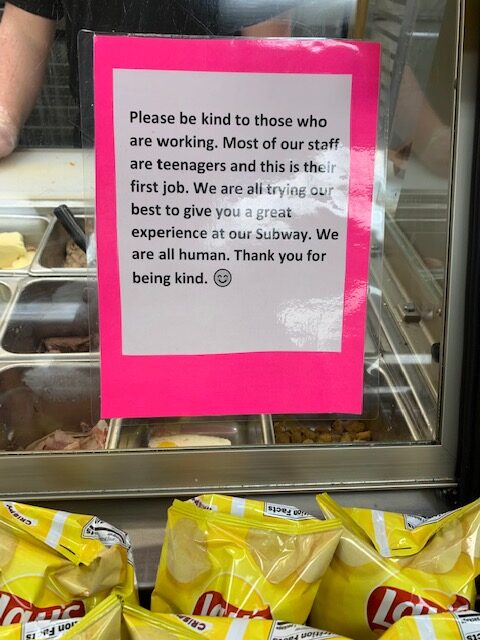
Let Your Gentleness be Evident to All

some dinner. As I was standing in line I saw this sign. One of my first jobs in high school was
working at a sandwich shop so I didn’t have to imagine what kind of behavior had prompted
Subway to put this sign up. I remember getting someone’s order wrong and being yelled at by a
customer because of it.
Philippians 4:5. The word all is very significant. We are not supposed to let our gentleness be
evident only to our family, not only to those we like, not only to those who are of a higher
status than us. We are supposed to let our gentleness be evident to all.
something that affects every aspect of our lives. We are called Christians because we are
followers of Christ. That means if we call ourselves Christians we are representing Christ in
every interaction of our lives. And Christ would have us be gentle with others. Even toward the
teenager who got your sandwich order wrong at Subway.
snapped at our family. We have said unkind words to customer service representatives.
Perhaps in our driving we have let our road rage be evident to all rather than our gentleness.
became one of us so that just as his mother wrapped him gently in her arms, he too could wrap
us gently in a hug and say, “I forgive you.” I forgive you for all the times you have been harsh
with your neighbor. I am gentle with you. Now go and show that gentleness to others.
gentleness of Christ. He was gentle with you, forgiving you of your sins. Therefore, let your
gentleness be evident to all.
Read more...

What will we do with this book?

Jerusalem. For years worship of the true God in Judah had suffered under a long parade of evil
kings, and by now the magnificent temple Solomon built three centuries earlier had fallen into
disrepair.
scroll—one that had not been touched for some time. He carefully examined the delicate book,
and his heart must have raced when he realized what it was. He hurried off to tell the secretary,
Shaphan, “I have found the Book of the Law in the temple of the Lord!” (2 Kings 22:8).
fairly undramatic fashion, “Your officials have paid out the money that was in the temple of the
Lord and have entrusted it to the workers and supervisors at the temple” (2 Kings 22:9).
Shaphan unrolled the scroll and began to read from it in the presence of the king.
“Go and inquire of the LORD for me and for the remnant in Israel and Judah about what
is written in this book that has been found. Great is the LORD’s anger that is poured out
on us because our fathers have not kept the word of the LORD; they have not acted in
accordance with all that is written in this book” (2 Chronicles 34:19-21).
lost and not missed for so long in the temple of the Lord?
his heart. And all the people pledged the same.
is in danger of being lost. Biblical illiteracy is soaring. Worship attendance is on the decline. Our
nation is quickly transforming from a post-Christian culture into an anti-Christian one.
can re-commit ourselves to living our lives by the Book of the Lord. What will we do?
Savior. May we treasure that Word, and each day commit ourselves to holding on to its truth.
Prayer: Lord, give me insight, peace, courage, and strength through your Word. Amen.
Read more...

Like Father, Like Son

I was doing some exercises in my home last week and my daughter came and started watching me. Then, she started imitating the exercise I was doing. She was excited that she and daddy were “getting strong muscles together.” Scenes like this are a common experience with every family in the world, because children imitate their parents. That is how they learn. They are constantly observing and imitating. So, it is no surprise that children often end up with behavior patterns and outlooks similar to their parents. And it is because of this that we have phrases such as “Like Father, like Son,” “Like Mother, Like Daughter,” and “The apple doesn’t fall far from the tree.” Often this similarity can be a joy for parents as they see their children acting just like them. Other times we wish our children hadn’t picked up a habit from us. I hope my daughter doesn’t pick up my propensity to worry or some of my other sins and flaws!
Thankfully, there was one Son who was like his Father in every way. And there were no bad habits for this Son to imitate. When Jesus spoke of his relationship with God, He spoke of it like the relationship between a father and a son. Jesus says in John 5:19-21 “Very truly I tell you, the Son can do nothing by himself; he can do only what he sees his Father doing, because whatever the Father does the Son also does. For the Father loves the Son and shows him all he does. Yes, and he will show him even greater works than these, so that you will be amazed. For just as the Father raises the dead and gives them life, even so the Son gives life to whom he is pleased to give it. In this verse Jesus says he imitates the Father perfectly. In fact, the son “can do nothing by himself; he can do only what he sees his Father doing.” This means it was the Father’s will to save you. Jesus is the perfect expression and manifestation of the Father’s will. So by looking at Jesus’ work, we know it was the Father’s will to save us. It was his will to rescue us from death and give us life. We know that was his will because that is what the son did! And after all, “Like Father, like Son.”
So, if you are ever wondering about how God feels about you or what his will is for your life, all you have to do is look at the Son. Because the Son is God and is the perfect manifestation of the Father’s will. And when we look at the Son, we find out that it is God’s will to love us, give us life, and to use us to glorify his name. Amen.
Read more...

You’re a Zombie! But you won’t be forever.

You’re a Zombie! But you won’t be forever.
Our culture (or at least a subset of our culture) is obsessed with zombies. This point is easy to prove when you look at the list of movies, TV shows, and books about zombies that have come out in the past two decades: World War Z, The Walking Dead, iZombie, Zombiland, I am Legend, etc. This is just a short selection of the Zombie entertainment available! Considering our culture’s obsession with zombies, I thought I would use zombies as a metaphor for different states of a human life: your life before Christ, your life with Christ, and your life at the resurrection.
First, we have your life before Christ. Without Christ your life is like that of a zombie. Think of a zombie in The Walking Dead. In The Walking Dead, the zombies are alive in a sense. But they are only alive because a virus has reanimated their corpse. These virus infected beings have no real will or consciousness of their own. They are driven only by an instinct to kill and consume. They are an object worthy of contempt and disgust and the best thing to do with these zombies is to put a bullet in their head before they hurt anyone. This is similar to our state of existence before coming to faith in Christ. The apostle Paul says in Ephesians chapter two that before Christ people are dead in their transgressions and sins. They are Zombies! The walking dead! their only desire is to “gratify the cravings of their flesh” (Ephesians 2:3). And in this state people are “by nature deserving of wrath” (Ephesians 2:3). Is there any hope! Yes.
Despite our wretched zombie state God loved us. Like Dr. Robert Neville (Will Smith) in I am Legend, he worked doggedly for a cure. And a cure was created by Jesus the son of God. This cure is delivered to us by the Holy Spirit using the syringe of the Means of Grace, God’s word and Sacrament. Once we have been given this cure we are made alive! God says this in Ephesians 2, “But because of his great love for us, God, who is rich in mercy, made us alive with Christ even when we were dead in transgressions – it is by grace you have been saved.”
This brings us to our second state of human existence, being alive in Christ. By giving us faith God has made us alive. For this state of existence think of the zombie “R” in the movie Warm Bodies. R is a zombie who begins to regain his humanity. He starts to like and desire good things like love, beauty, and music. He fights against his zombie nature to become more and more human. This is what our life in Christ on this earth is like. Christ has made us alive and out of thankfulness for that gift we desire to live a life according to his word. We desire good and godly things. However, we are still plagued by what we call “the flesh.” We still have our old sinful zombie flesh that desires to be its sinful zombie self. And so, we have to fight against that nature. To fight against that nature we need to keep getting doses of the cure. We need to return to God’s word regularly so our sinful nature doesn’t take over again. This struggle doesn’t stop until we pass away. But that is when our life as a zombie ends.
After we die our souls go to be with God. Then, on the last day our bodies are resurrected by God. And God will not resurrect zombies. He is going to resurrect us and restore us to our full human state. We will be resurrected the way God intended humanity to be all the way back at the garden of Eden, created in his image glorious and beautiful.
Until that day, my zombie brothers and sisters, keep fighting against your zombie nature. Come and keep getting doses of the cure, Jesus. That cure is only found in God’s word.
Read more...

What speaks, yet has no words?

What speaks, yet uses no words? What beautifully and eloquently declares the power, wisdom and glory of God, yet does so without employing human language or speech?
God’s creation does. And we’d better pay attention.
King David must have been musing on the wonders of a star-studded key as he wrote: “The heavens declare the glory of God; the skies proclaim the work of his hands. Day after day they pour forth speech; night after night they reveal knowledge. They have no speech, they use no words; no sound is heard from them. Yet their voice goes out into all the earth, their words to the ends of the world” (Psalm 19:1-4).
All creation testifies to God’s power, wisdom and glory. The “voice” of the heavens reaches out into the remotest parts of the world. Yet the world, it seems, refuses to listen. It’s considered the height of wisdom to reject the very idea of a Creator—to act as if the world is all there ever was and to say that there is not and never was a Maker. But the stars in the night sky shout it out. There is a God! He is the Maker of all. He is awesome. And he is real.
Still, nature can only reveal so much. It cannot tell us who this God is and what he did to save us. For that, we need another revelation—the Bible: “The law of the Lord is perfect, refreshing the soul. The statutes of the Lord are trustworthy, making wise the simple. . . The decrees of the Lord are firm, and all of them are righteous. They are more precious than gold, than much pure gold; they are sweeter than honey, than honey from the honeycomb. By them your servant is warned; in keeping them there is great reward” (Psalm 19:7-11).
Only God can tell us who he really is, that he is Triune—Father, Son, and Holy Spirit. Only he can tell us how deeply and dearly he loves us. Only he could have revealed his plan to save his fallen world. Only he could have told us that he so deeply loved the world that he sent his Son to live among us and die, so that we might live with him in unending peace and joy.
When this God speaks, I need to listen. Sin is so deeply ingrained in my heart that I sin when I know better, and even when I don’t want to. “But who can discern their own errors? Forgive my hidden faults. Keep your servant also from willful sins; may they not rule over me” (Psalm 19:12,13). My sin is not a minor corruption. Only God can undo its awful effects. And the heart and core of the Bible’s message is that he has!
As amazing as the heavens are and as eloquently as the stars speak about the power of our Creator, we rejoice even more in the wisdom and love he has revealed to us in his Word.
We pray: “May these words of my mouth and this meditation of my heart be pleasing in your sight, Lord, my Rock and my Redeemer” (Psalm 19:14). Amen.
Read more...

Americans demand their rights, but Christians yield their rights.

Americans demand their rights, but Christians yield their rights.
We are guaranteed certain rights under the Constitution like the freedom of speech, the freedom of religion, and the freedom to assemble. In the Declaration of Independence, the founding fathers declared that we have certain unalienable rights such as life, liberty, and the pursuit of happiness. The thirteen colonies felt they were justified in rebelling against the British government because, in their view, these rights were being trampled upon and taken away.
Still to this day, we Americans like to talk about our rights. We like to exercise those rights and we demand those rights. And we still have this sense that it is right to rebel if our rights are being taken away and trampled upon. This spirit of demanding our rights has prevented the U.S. government from becoming too controlling. And I will be the first to admit that I am glad I live in a country where certain freedoms and rights are guaranteed. It is the freedom of religion and the freedom of speech that allows me to publish this content on Facebook!
However, as Christians, we have to be careful that this spirit of demanding our rights doesn’t creep into our individual outlook and our interactions with our neighbor. Because after all, we are followers of Christ first; we are Americans second. And Christians don’t demand their rights; they yield their rights.
Let me prove that point with a few Scripture passages.
Romans 12:10 – “Honor one another above yourselves.”
Romans 12:17 – “Be careful to do what is right in the eyes of everyone.”
Ephesians 5:21 – “Submit to one another out of reverence for Christ.”
All of these passages encourage us to consider others before we consider ourselves. And that includes honoring and submitting to others rather than demanding our rights. The apostle Paul provides an excellent example of how this is carried out in daily life. He wrote to the Corinthians:
Though I am free and belong to no one, I have made myself a slave to everyone, to win as many as possible. To the Jews I became like a Jew, to win the Jews. To those under the law I became like one under the law (though I myself am not under the law), so as to win those under the law. To those not having the law I became like one not having the law (though I am not free from God’s law but am under Christ’s law), so as to win those not having the law. To the weak I became weak, to win the weak. I have become all things to all people so that by all possible means I might save some. I do all this for the sake of the gospel, that I may share in its blessings. – 1 Cor. 19-23
In that section the apostle Paul talks about yielding his rights for the sake of sharing the gospel with others. When he was around Jews, he became like a Jew. That means he would do things like not eat pork, refrain from working on the Sabbath, and offer sacrifices at the Temple. Paul had every right to eat pork, work on Saturdays and abandon the Old Testament sacrificial practices. But when he was around Jews, he yielded his rights so that he could “win the Jews” and “possibly save some.” He yielded his rights so that the Jews would be comfortable around him and so that he could share the gospel with them. On the other hand, when he was around “those not having the Law” (aka Gentiles) he became like one not having the law. So, when he was with Gentiles he felt free to eat pork, work on Saturdays, and refrain from offering sacrifices. Paul’s example shows that Christians do not demand their rights and throw their freedoms in the face of others. Rather we put others first and yield the rights and freedoms we have if it will help us share Christ with someone else.
For example, If I was trying to share Jesus with a group of Muslim people, I might refrain from drinking alcohol. I have every right to drink alcohol – it is not a sin. But in the Muslim religion drinking alcohol is forbidden. So, if I insisted on drinking alcohol while I was with Muslims I would probably offend them. And that offence would become a hindrance in sharing the gospel with them. In order to show I love them and make them feel comfortable, I would refrain from drinking alcohol. Christians yield their rights for the sake of the gospel.
Ultimately, we have this yielding spirit because it is the same spirit Christ had. Jesus did not win us salvation by a show of force, by rebelling against the authority, and demanding freedom from sin. No, he won us salvation by yielding all his rights. Let’s look at three rights we hold deer that Jesus gave up to save us: life, liberty, and the pursuit of happiness.
When Jesus came to this earth he yielded his right to pursue happiness. His mission on earth was not to win himself an enjoyable life. Rather his mission was to live perfectly keeping all God’s laws so that he could give that perfect life to you and me.
When Jesus was on this earth, he gave up his right to liberty. Although he could have called down legions of angels to defend him when the soldiers came to arrest him, he allowed himself to be unjustly arrested. He yielded his right to liberty.
Then he yielded his right to his body and his dignity. He allowed himself to be insulted, spat upon, and stripped naked. He allowed himself to be beaten multiple times. He gave up his right to justice and a fair trial, saying nothing when they brought false accusations against him. And finally, he gave up his right to life. He gave it up by allowing them to crucify him.
Jesus yielded all these rights so he could save you and me. He did it so that God the Father would yield his right to wrath and justice – and instead say, “Your sins are forgiven.”
Americans like to demand their rights. But we are Christians first, Americans second. Christ yielded his rights, and so do we.
Read more...

Does It Ever Stop Spinning?

Does It Ever Stop Spinning?
finally lay your head down at night, life moves at an incredibly fast pace.
made (for those who brown bag it), the dog has to be fed and let out, and then you have to get the kids
off to school. After the kids are gone, you have to get to work (unless you’re working from home). Once
at work, it’s an endless circle of reports, meetings, and more reports. After a long day, you make it
home. Exhausted, you search for your second wind. There is dinner to help prepare, see that the kid’s
homework gets done, dishes to do, a load of laundry to run, and kids to get to bed. Finally, you get to sit
down and relax. You now have a whole fifteen minutes to yourself before it’s your bedtime. You look at
the clock. How did it get so late! You get into bed and turn off the lights. Just think. You get to wake
up and do the same thing all over again in the morning!
always going to be?
deadlines. The retirement years must be days of well-earned leisure. Apparently not. Every single
retiree that I’ve spoken to tells me they are busier now than they’ve ever been! They remain on the go!
Maybe we feel so rushed because we’re trying to make the most of every available hour.
you’re a golfer, you find time for that. If your kids play sports, you make time for that. If you have a
cottage, you try to use it as much as possible. If you enjoy hunting or fishing, somehow, someway, you
find time to sneak that in. Amazing, isn’t it?
a few minutes during the day for a devotion or prayer. Just an hour on a Wednesday night or Sunday
morning. See if you won’t find that when you make time for Him, life really does slow down for just a
bit. The outside world stays away. You can relax, refresh, and rejoice.
the dog to the vet this week, make some time for God. See if life, in fact, doesn’t slow down just a bit.
remember just how much I need you. I look forward to our quiet moments throughout the week, and
our special time together in your House. Amen.
Read more...

Come, Follow Me

casting a net into the lake to catch fish. He tells them, “Come, follow me.” And they leave their
nets to follow him. Now, understand: he’s met them before. This isn’t a first-time cold call. But
when Jesus calls, they’re ready. . . and they go.
father preparing their nets. Jesus calls them, too. “Let’s fish for souls,” he says. And they drop
everything. They leave their boat. They leave their father. And they go and follow Jesus.
store? Who leaves behind job, family, and home just to be with Jesus and learn from him? I
guess you could say: only somebody who really wants to. Only someone who sees Jesus for who
he is and knows the peace and blessing only he can bring.
and Savior of the world. Yet he took on the nature of a servant. “He humbled himself by
becoming obedient to death—even death on a cross!” (Philippians 2:8). He did it to cancel our
debt of sin and give us the joy of everlasting life.
it—at least not at this time. But what they did know about Jesus made them want to give
something in return. And so when they hear his call to come and follow him, they answer that
call with joy. They give him their lives.
his disciple—to learn from him, to walk in his ways, and to share the good news with all. He’s
calling you to get involved in his work—to go out and “fish for souls.” How will you respond?
Read more...

Actions Speak Louder Than Words

can show more about what you believe in than what you say. Also, if we act in a way that is
consistent with what we say, our integrity increases in the eyes of others. I would like to apply
this saying to the character Joseph in the Christmas story.
of Joseph’s words. It only records what he does. Our verses for study come from Matthew 2:13-
15, 19-23. The Magi had recently left the land of Israel after visiting Jesus. The wicked king
Herod wanted to have the baby Jesus killed because the Magi had proclaimed him a King.
Herod saw this as a threat to his position of power. In order to protect the messiah from Herod
God warns Joseph in a dream to take the child down to Egypt. And we read, “So he got up, took
the child and his mother during the night and left for Egypt.” That’s it. No words, no questions.
There are simply three verbs in that sentence: got up, took, and left. But these three simple
actions speak volumes about Joseph. He must have had an amazing faith. In order to protect
the family God had given him Joseph leaves his house, his business, perhaps his family too. He
left with Mary and Jesus for a land where the culture and the language were probably
unfamiliar. And he had no idea what he was going to do when he got down there. Nevertheless,
Joseph got up, took, and left.
and leave for a foreign country? First, he must have had to put his trust in the words God. God
had told him in a dream that Mary’s child was “from the holy spirit” and would “save his people
from their sins” (Matthew 1:20,21). If this child was going to be the savior. God would have to
preserve him to do his saving work. So Joseph left, trusting that God would provide. Second,
God had already provisioned them for their trip. The Magi had given gifts of gold frankincense
and Myrrh, gifts that were extremely valuable. These gifts may have even still been in the
traveling containers that the Magi brought them in. Joseph had funding for the trip, and seed
money for a starting a new life down in Egypt, ready to go. So, Joseph trusts God and leaves.
Showing his faith with his actions.
testimony for what we believe in. In order to do this we will have to recognize two things. First,
We will have to recognize the promises in God’s word. We can forgive knowing that God has
promised to forgive us. We can be generous knowing that God has promised to provide for us.
Secondly, recognize the blessings already given. Recognize that God has already provisioned
you with everything you need to live a life in thankfulness to him. A life of thankfulness and a
life using the blessings you have been given to help others are actions that speak volumes.
Read more...

Are You the One?

Read more...
